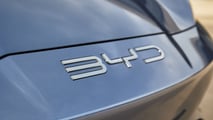
- EU lowers proposed import duties for Chinese cars, which will be voted into law in October if at least 15 of the 27 EU members agree.
- Tesla gets a big break from the revised rules, with its duty for China-built vehicles dropping from 20.8% to 9%.
- Even if the new duties have only been enforced provisionally since July 5, they already seem to be affecting Chinese car sales on the continent.
One of the ways the European Union is trying to put the brakes on what it expects will be a flood of cheap electric cars manufactured in China is by increasing tariffs. The new higher import tariffs for Chinese EVs were announced and adopted provisionally in early July, and they will be voted into law in October.
The EU has backtracked on its initially announced plan to enforce additional duties of up to 37.6% (on top of the 10% import tax that was already in place for Chinese cars), dropping it to 36.3%. This will vary from automaker to automaker, with Tesla getting the lowest duties that were recalculated and dropped from 20.8% to 9%.
The difference stems from how heavily the Chinese state subsidizes an automaker's production. Tesla is the least subsidized out of all Chinese manufacturers that export to Europe, according to the EU, so EVs from other companies will be hit with duties ranging between 17% and 36.3%. The EU sees these state subsidies as unfair and argues that they are in place to create overproduction and flood the continent with cars so cheap that no domestic automaker could compete.
Gallery: 2024 BYD Seal Review







BYD will also be on the lower end of the new duties, with its vehicles being subject to an additional 17%, while SAIC (which sells China-made vehicles under the MG brand) will get the full 36.3%. Vehicles imported into Europe by Volvo owner Geely will incur an additional 19.3%.
Bloomberg notes that if a Chinese manufacturer has a joint venture with one from Europe, this will cap the maximum possible duties at 21.3% instead of the full 36.3%.
Even though the tariffs have only been adopted provisionally for now, they’re already having an effect on sales. SAIC saw a 45% sales drop in July compared to June, although a 36% drop in all EV sales was observed in the European bloc’s 16 largest markets, so that may have also had an effect.
Year-over-year, though, some Chinese manufacturers are still ahead. BYD, for instance, has sold 20% more cars in the EU so far in 2024 than it did over the same period in 2023. However, if it raises prices to counteract the higher duties, the attractiveness of its models for European buyers may start to fade.
One of BYD’s most important models in Europe is the Seal electric sedan (pictured), which is one of the few direct rivals to the Tesla Model 3. The Seal is already slightly more expensive than the Tesla, so if BYD raises the price further, it may lose its edge created on the basis of it being a slightly more luxurious proposition than the Model 3 at a similar price.
It remains to be seen what impact these higher duties will have on Chinese EV sales in the EU after they are officially adopted in October. Some Chinese manufacturers currently apply significant markups on their vehicles, which they are able to manufacture far cheaper than a comparable car coming out of Europe. Buyers in Europe may not feel the full brunt of the extra 36.3%, as automakers from China will simply drop some of the markup and lose a small proportion of the profit they were hoping to make.
Gallery: Leapmotor T03



If the higher duties are put in place, one way around them will be for Chinese automakers to localize production in Europe. Several manufacturers are already looking for locations to open manufacturing facilities. BYD is the most advanced, with work on its factory in Szeged, Hungary, already underway and plans for a second factory in Turkey.
Dongfeng is another manufacturer with plans to open a manufacturing location in Europe, and it’s eyeing Italy. Leapmotor doesn’t have plans for a factory, but Stellantis is already assembling its T03 subcompact EV in Poland in the plant that also builds Jeep and Fiat models, which makes the little T03 (pictured) exempt from tariffs and duties.
Reuters notes that there isn’t a consensus among European nations on whether these new duties should be implemented or not. At least 15 of the 27 member states need to vote in favor of their adoption, and among its backers are France, Spain and Italy. Germany, Sweden and Finland reportedly abstained from voting on the matter.







